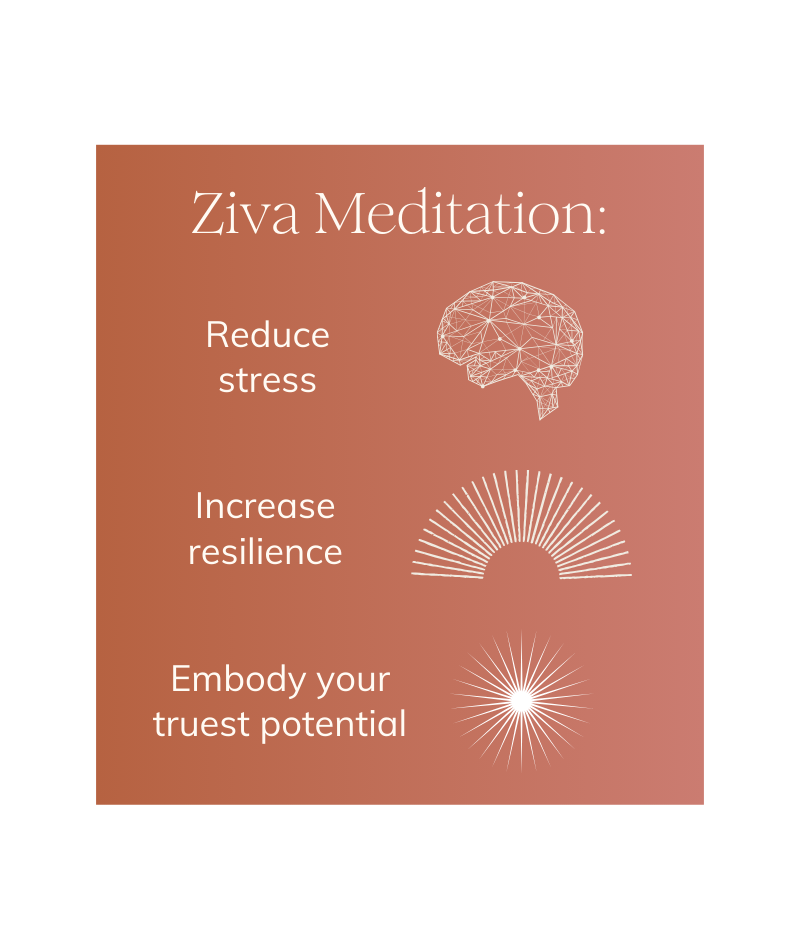TAUGHT AT AND FEATURED IN
Where does your unique Ziva Journey begin?

HI, I'M EMILY
+ I Want to Help You Fall in Love with Meditation & Your Life
I've lived many lives in one body, starting with a decade on Broadway where the demands of performing 8 shows a week led to stress and insomnia. Discovering meditation transformed my life, prompting me to leave Broadway and train as a teacher in India for three years.
Since then, I’ve taught over 50,000 people the Ziva Technique of mindfulness, meditation, and manifesting. I also wrote a best-selling book, became a mother, and now host a top-rated podcast called "Why Isn’t Everyone Doing This?"
I've spent the last few years developing Ziva Magic, an Embodied Manifesting course that helps you get exactly what you want—using visualization, Emotional Alchemy, somatic movement, Breathwork, and Pleasure Prayer. It feels like magic, but it's backed by science.
Now, I want to help you find the next step in YOUR journey. I’m so outrageously excited you’re here. Let’s see how good life can get shall we?
Get Out Of Fight or Flight and Into Stay and Play
Whether you’re a beginner or have been meditating for years and want to transform your practice, Ziva Meditation brings you back to the basics and reconnects you to a practice you’ll love. So if you…
- Feel like stress, pain, or worry are running the show + are ready to take your life back
- Are a total beginner looking for a meditation practice you can *actually* stick to
- Want a sense of calm, not just in the moment, but in the fabric of your life
- Aren’t obsessed with your current meditation practice (hint: you don’t do it every day) and want to learn how to not just meditate, but self-induce transcendence
Then you’re in the right place.
-

MARK HYMAN, MD.
Functional Medicine Leader & 15x NYT Bestselling Author
I am shocked by what Ziva has done for me. I am calmer, less anxious and have so much more energy now. After I meditate I feel refreshed like I’ve had a long nap.
For the few minutes I invest in Ziva, I get back three hours of productivity.I don’t have time not to meditate. -

VYLANA
Artist, Sound Alchemist, Medicine Woman
Since working with Emily, I am better equipped to handle things that would’ve had me spiraling into stress in the past. Now, I’m more grounded and am in such a state of flow. My old perfectionism is falling away and making space for the real me to shine. She is spiritual balm for my soul.
-

ANDREW HUBERMAN, PhD
Neuroscientist & Host, Huberman Lab Podcast
Emily is a deep scholar of meditation. She makes learning it incredibly playful, fun, and entertaining. Ziva is anything but boring, and it very well may change your life.
-

JENNA DEWAN
Actress & Wellness Advocate
There are a million apps and meditation techniques out there, just trust me and go to Ziva. Learning meditation with Emily was the first tool that really allowed me to tune into my inner wisdom. Seriously, this practice has changed my life.
You Deserve To Have A Meditation Practice You’re Obsessed With
There has been a wild surge in wellness practices like medicine ceremonies, breathwork, darkness retreats, and cold plunges, which is thrilling. But no amount of “cutting-edge biohacking” will ever replace the need to regulate your nervous system every day, twice a day. This twice-daily technique helps you feel safe in your body, floods your brain with dopamine and serotonin, and supports physical, spiritual, and emotional transformation.
By getting rid of the stress from your past + healing on a cellular level, you can increase your state of consciousness and optimize your performance – at work, in your craft, in life, in your relationships – whatever that means for you.
Ready to dive in?
Expand Your Power, Deepen Your Pleasure, & Transform Your Life.
Ziva Magic helps you expand into a life of intention, pleasure, and possibility - tapping you into your internal pharmacy to transform your life.
So if you...
- Have a big dream but need support to bring it to life
- Sense a deeper potential within you waiting to be unlocked
- Want to change your relationship with pleasure
- Crave a practice that connects you to yourself and something greater, allowing you to feel both wildly free and deeply rooted
…then you’re in the right place.
EXPLORE THE ZIVA WORLD
-
-
Read Emily's Bestselling Book
Debuted at #7 on Amazon. Featured in The New York Times, Forbes, & The Today Show. Stress Less, Accomplish More rewires your brain, dissolves stress at the root, and unlocks your potential with Emily’s stories, meditations, and the neuroscience behind the Ziva Method. Join 100,000+ readers who have transformed their lives.
order now -
Listen to Emily's Podcast
Join the "Why Isn’t Everyone Doing This?" podcast each week as Emily Fletcher dives into groundbreaking and taboo topics with experts, healers, scientists, and more. From breathwork to psychedelics, meditation to BDSM, no topic is off-limits. Discover your bliss and unlock personal transformation. Tune in to explore your highest self!
tune in now -

Wondering If Our Practices Will Really Work For You?
- Does this work for a “beginner”? Meditation & manifestation is totally new to me.
Absolutely! We understand that stepping into the unknown can feel daunting. That's why our approach is designed to support you every step of the way, offering a clear, gentle introduction to our practices. We help demystify the process, ensuring you feel comfortable and informed about what to expect and the transformative benefits that await.
- I’m not sure I’m comfortable or “ready” to get started because meditation and manifestation aren’t a daily practice for me now.
It's natural to feel secure in familiar routines, but we help you gently transition from old habits that no longer serve you to new, empowering practices. Our program is tailored to ease you into changes at your own pace, enhancing your life without overwhelming disruption.
- I’m too busy for meditation or manifestation. How could I fit this in?
Nobody is too busy for meditation, and we love what Dr. Hyman says, “For the few minutes I invest in Ziva, I get back three hours of productivity. I don’t have time not to meditate.”
We recognize the challenge of adding something new to an already full plate. But Ziva Meditation is designed to give you more time in your day by giving you rest that is 5x deeper than sleep. On the other side, you’ll find that with your enhanced energy and mental clarity, you’ll make your way through your to-do list quicker and more efficiently.
- I’m dealing with a lot of stress. Will this work for me?
Our program is specifically designed to provide a safe space where you can explore your reactions to stress without judgment. We offer tools to help you calmly face and manage your stress responses, turning them into opportunities for growth and resilience.
- I’ve struggled with “spiritual teachers” in the past. Are you any different?
We are deeply committed to integrity and authenticity in our spiritual teachings. We're sorry to hear about your past experiences, and we invite you to explore our program at your own pace, with transparency and support, so you can heal and find true spiritual fulfillment.
- I’m not sure I’m really capable of meditation or manifestation.
Self-doubt can be a significant barrier, but we are here to remind you of your innate potential. Everything you need is within you and lovingly provided by Nature. We are here to help you realize that you are more than capable of achieving transformation and you are deserving all the benefits it brings.
- Why do your programs talk about pleasure? What does that really mean?
We believe that pleasure is a powerful gateway to manifesting your dreams. And not only that, but that feeling good is your divine right – deserving of celebration, not shame. Ziva Magic helps reframe your understanding of joy and pleasure, showing you how they can be powerful tools for healing trauma and creating a life that feels like magic.

























